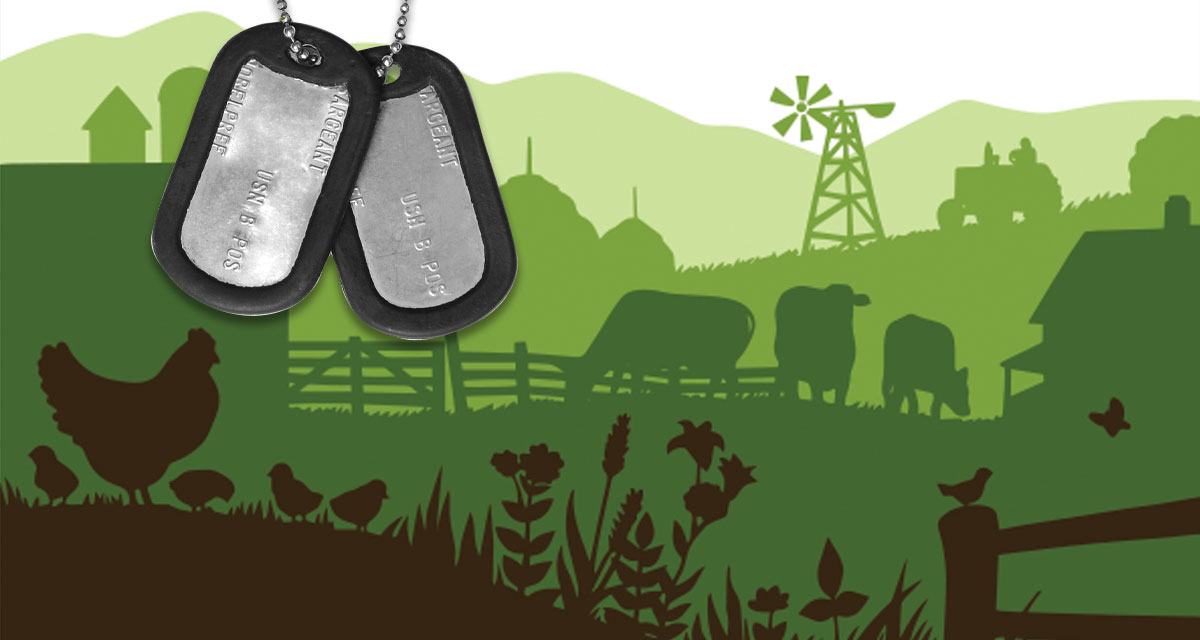Robert Elliott’s story is familiar. After 15 years serving in the Marines, he struggled to find employment in the civilian world amid a recession in 2011. Elliott writes, “I tried school. Actually, I tried everything, but nothing was working out. Then, I learned quickly why veterans commit suicide immediately after leaving the service, and I had to do something. Of all the things, farming seemed like my only answer.” Local news outlets and word of mouth spread the word of Elliot’s success as a military veteran who had found a meaningful career in agriculture. Seeking to help other veterans, he founded the Veteran’s Farm of North Carolina, Inc, VFNC, on his multi-century family farm and began training interested men and women. Elliott’s idea aided the launch of the Soldier to Agriculture program, a partnership between Ft. Bragg and N.C. State Agricultural Institute.
Farming, an Ideal Match for Veterans
Most veterans feel a disconnect returning to the civilian world. From their uniform to meals, days are structured. Elliott expresses, “The farm saved my life. Coming home, I no longer had a purpose and lacked the support needed to get me to the next step.” Farming is one field that fulfills the responsibility of providing for the family and supporting the community, while working in a peaceful environment. Elliott expresses, “Vets are ready-to-work types with a mindset to rise early every morning, and they have no choice but to work hard. If agriculture is North Carolina’s biggest industry, it needs more people, particularly veterans.” In registering for the Soldier to Agriculture program, military members can transition surrounded by the veteran farmer network; it is one avenue to offer a lifeline.
A Six-Week Program
All active-duty service members with six months or less on their current enlistment, veterans, and military or veteran spouses can register for an Introduction into Agriculture course at Fort Bragg in Fayetteville. Online class lectures lead the way to practical hands-on learning opportunities.
The curriculum includes:
- Crop Science: A career opportunity for individuals seeking production, field research, or consulting on the production of food, feed, fuels, and fibers for a world population.
- Turfgrass Management: Applicable as a career path, turfgrass management studies a range of topographies, climate, and soils in North Carolina.
- Small-Scale Farming: Emphasizing sustainability of crops and livestock while working on small acreage, without using advanced technology and equipment.
- Horticulture: Linking the science, technology, and business of annual and perennial species, from fruit trees and berries to crops and medicinal herbs and flowers. Lessons extend beyond the sustainable production of greenhouse and soil-based plants, including hydroponics.
- Livestock and Poultry Management: More than just animal husbandry, lessons range from housing principles, space requirements, hatching and brooding of chickens and ducks to managing sheep, goats, pigs, and cows.
- Precision Agriculture: The farming management concept offers a means to lower land usage, water, fertilizers, herbicides, and insecticides to optimize crop yields and profitability.
- Agricultural Business: Modern farming consists of the farming, management, production, and marketing of livestock and crops. As technology has progressed, farmers need to solve high-tech needs and problems.
The Next Chapter
The Soldier to Agriculture program provides networking opportunities and resources beyond the six-week course. Participants can take advantage of a three-week experience to apply their knowledge alongside experts in the agricultural industry, or meet with recruiters, who provide careers in agriculture. As a result of training and continued support, vets in North Carolina are opening farmer’s-table restaurants, participating in markets, partnering with certified kitchens, and forming food hubs. “We could not grow past mentorship opportunities and consultation for veterans without the community helping us in various ways,” Elliott explained. “Farm equipment donations, financial support, or even skilled tradesmen and women, from bulldozer operators to carpenters and drone pilots, are a big help to us, too.”
If interested in the Soldier to Agriculture program, contact instructors through Facebook or N.C. State University’s Agricultural Institute website.























